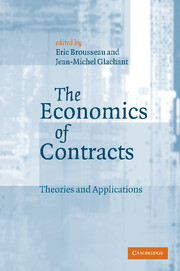Book contents
- Frontmatter
- Contents
- List of figures
- List of tables
- List of contributors
- Acknowledgments
- Part I Introduction
- Part II Contracts, organizations, and institutions
- Part III Law and economics
- 6 The contract as economic trade
- 7 Contract theory and theories of contract regulation
- 8 Economic reasoning and the framing of contract law: sale of an asset of uncertain value
- 9 A transactions-cost approach to the analysis of property rights
- Part IV Theoretical developments: where do we stand?
- Part V Testing contract theories
- Part VI Applied issues: contributions to industrial organization
- Part VII Policy issues: anti-trust and regulation of public utilities
- Bibliography
- Index of names
- Subject index
8 - Economic reasoning and the framing of contract law: sale of an asset of uncertain value
Published online by Cambridge University Press: 16 January 2010
- Frontmatter
- Contents
- List of figures
- List of tables
- List of contributors
- Acknowledgments
- Part I Introduction
- Part II Contracts, organizations, and institutions
- Part III Law and economics
- 6 The contract as economic trade
- 7 Contract theory and theories of contract regulation
- 8 Economic reasoning and the framing of contract law: sale of an asset of uncertain value
- 9 A transactions-cost approach to the analysis of property rights
- Part IV Theoretical developments: where do we stand?
- Part V Testing contract theories
- Part VI Applied issues: contributions to industrial organization
- Part VII Policy issues: anti-trust and regulation of public utilities
- Bibliography
- Index of names
- Subject index
Summary
Introduction
I have been teaching the basic Contract Law course for a few years now, and have been struck by the courts' frequent indifference to economic context. It is not so much a matter of the court arriving at the wrong answer as it is the court's asking the wrong questions. In too many instances the court frames the problem in away which obscures the essential features of the transaction. A little – very little – sensitivity to some elementary economic concepts can go a long way toward illuminating a number of problem areas.
In this chapter, I want to illustrate this proposition by engaging in a close analysis of two American court decisions often featured in contracts casebooks: Mattei v. Hopper and Bloor v. Falstaff Brewing Corp. This is a piece of a larger project (Goldberg 2002). The other chapters in Part III have emphasized the manner in which contracting parties allocate to one party the discretion to respond to changed circumstances, but constrain that flexibility by conveying the counterparty's reliance interest. These decisions raise a different problem: production and transfer of information regarding the sale of an asset of uncertain value. Had the courts chosen to frame the problems this way, disposition of both cases would have been straightforward. The court's decision in the former case remains unaffected, but the implications for similar cases would be quite different. The decision in the latter case is simply wrong.
There are a large number of institutional responses to the information problem. I will focus on two which explain nicely the structure of the contracts in controversy.
- Type
- Chapter
- Information
- The Economics of ContractsTheories and Applications, pp. 126 - 139Publisher: Cambridge University PressPrint publication year: 2002
- 1
- Cited by



